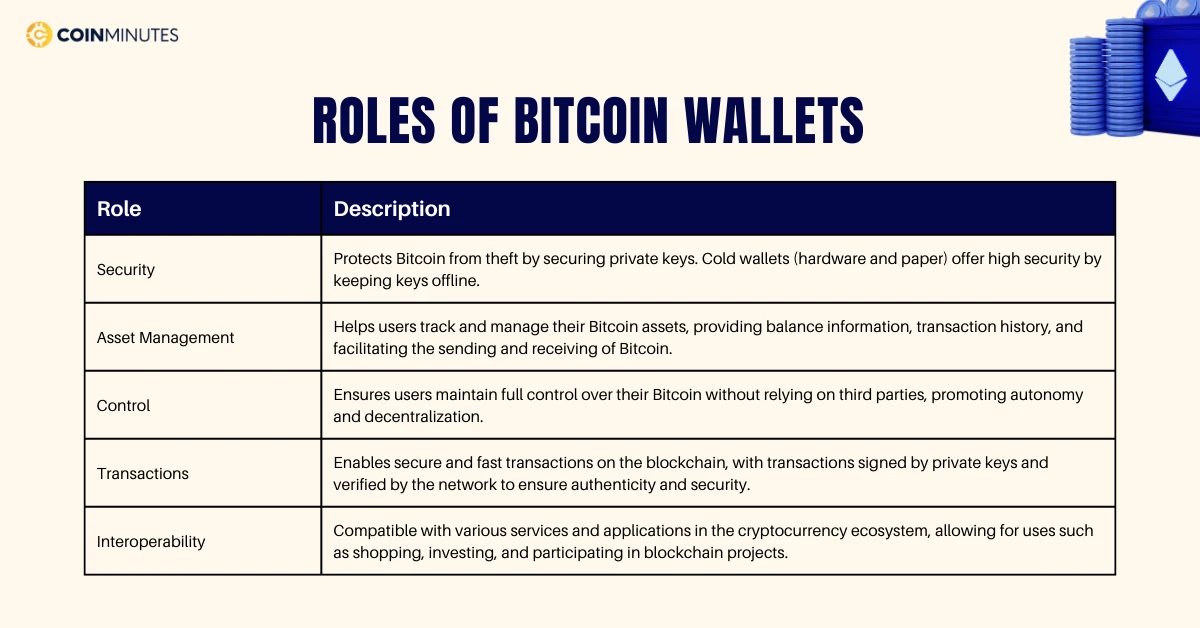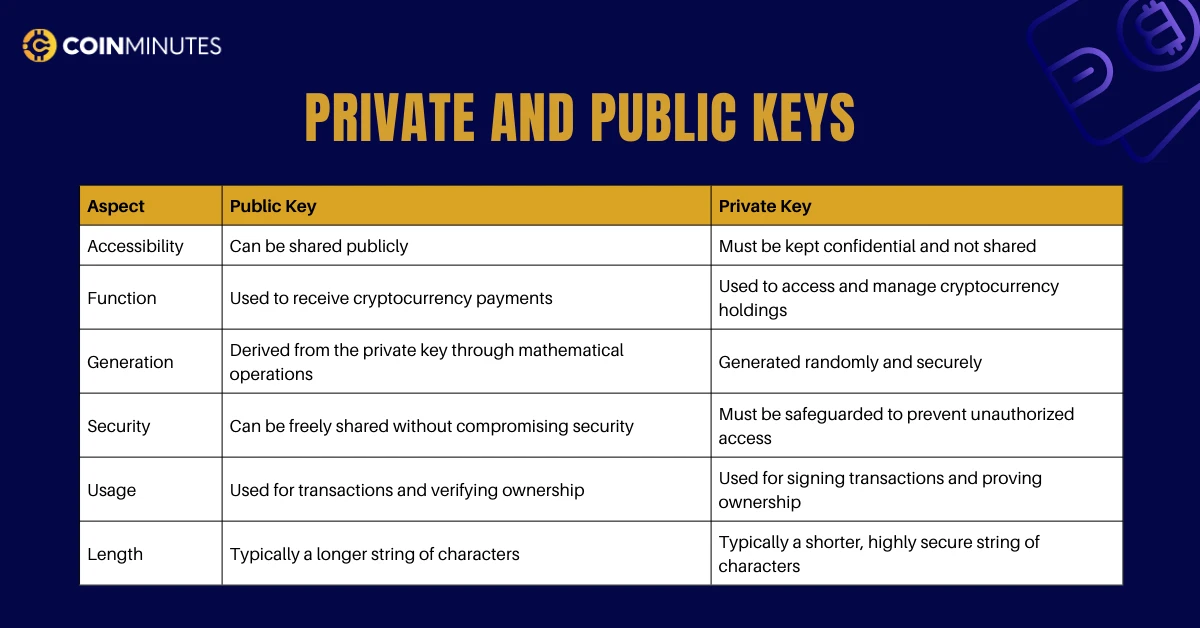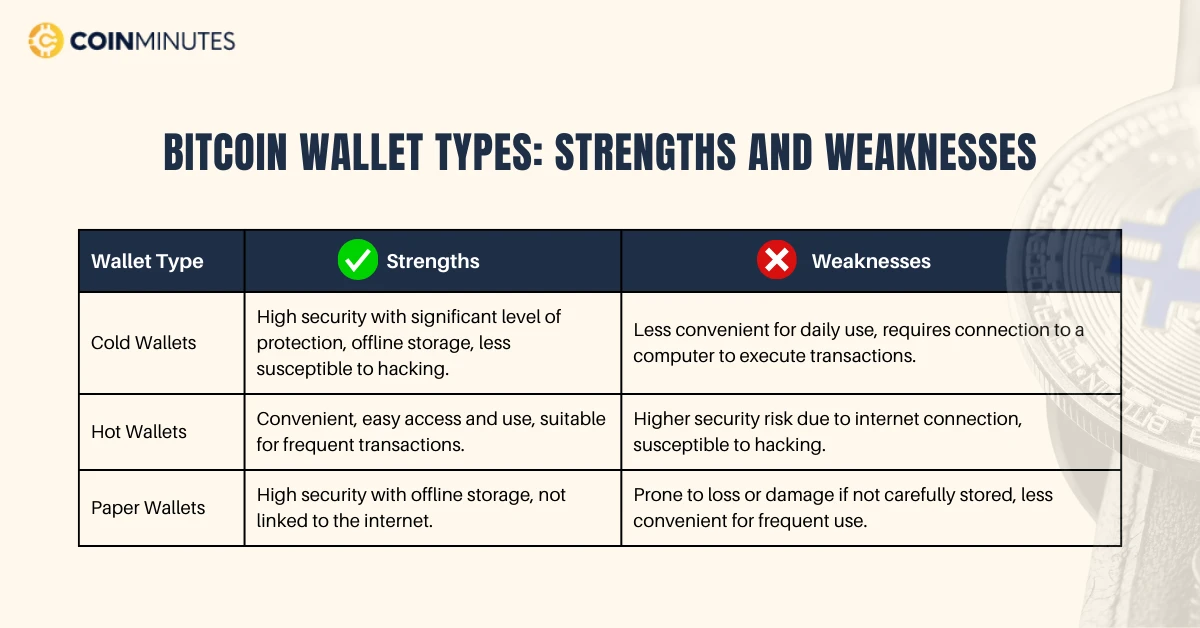Have you heard about Bitcoin, the digital currency shaking up the financial world? This decentralized currency operates without government or bank control, giving people more control over their money. As Bitcoin’s influence grows, understanding Bitcoin wallets becomes crucial. These digital vaults protect your Bitcoin holdings and streamline transactions within the cryptocurrency world.
In this article, CoinMinutes explores Bitcoin wallets’ different types and functions, offering a detailed guide on how a Bitcoin Wallet works.
Key Takeaways
|
What Is a Bitcoin Wallet?
A Bitcoin wallet is a digital tool that stores, sends, and receives Bitcoin. It works similarly to a traditional wallet, but instead of storing cash, it stores the cryptographic keys used to access your Bitcoin on the Bitcoin ledger (blockchain).
Bitcoin wallets play an essential role in the cryptocurrency ecosystem because they provide a secure way to store and manage Bitcoin. Without a Bitcoin wallet, you would not be able to use Bitcoin to purchase goods and services or send money to others.

How Does a Bitcoin Wallet Work?
In the Bitcoin system, the public and private keys are two fundamental elements ensuring the security and integrity of transactions. Each Bitcoin wallet created consists of a pair of keys: the public key and the private key. Understanding the functions and roles of each type of key is essential to safeguard assets and conduct transactions securely.
What Is a Private Key?
This is a confidential code that grants its holder the ability to conduct cryptocurrency transactions and assert ownership over their assets. In the case of Bitcoin, private keys are represented by a 256-bit string composed of alphanumeric characters. They are securely stored within your cryptocurrency wallet, allowing you to retrieve and utilize your Bitcoin as needed.
What Is a Public Key?
Unlike a private key, a public key is designed to be disclosed to other people so they can send you cryptocurrency. It is generated from your private key through complex mathematical operations.
Imagine public and private keys like you would your house address and house keys, respectively. People will need your house address so they can stop by, yet will only be able to enter with your house keys.

At their core, Bitcoin wallets facilitate the storage, sending, and receiving of Bitcoin by managing cryptographic keys. Below is a detailed explanation of how a Bitcoin wallet operates.
- Creating and Managing Keys: When you create a Bitcoin wallet, it generates two types of keys – a private key and a public key. The private key is kept secret and never shared. The public key is derived from the private key and is used to generate your Bitcoin address, where you receive Bitcoin.
- Receiving Bitcoin: When someone sends you Bitcoin, they use your Bitcoin address (corresponding to the public key). This transaction is recorded on the blockchain, a public ledger of all Bitcoin transactions.
- Sending Bitcoin: When you want to send Bitcoin to someone else, you specify their Bitcoin address and the amount. Then, you use your private key to sign the transaction, proving that you’re the owner of the Bitcoin being sent. This transaction is also recorded on the blockchain.
So, a Bitcoin wallet helps you manage and perform Bitcoin transactions securely and transparently by creating and handling keys, receiving Bitcoin through your address, and sending Bitcoin by signing transactions with your private key.
Types of Bitcoin Wallets
Bitcoin wallets come in various forms, each catering to different needs and security preferences of users. Understanding the distinctions between these types is crucial for safely managing Bitcoin assets in the digital realm. Let’s delve into three main types: Cold Wallets, Hot Wallets, and Paper Wallets, exemplified by leading industry names.
- Cold Wallets: Cold wallets are Bitcoin wallets stored offline, disconnected from the internet. This makes them more secure against online threats and computer viruses. An example of this type is Ledger Nano S, produced by Ledger, one of the leading companies in hardware wallets.
- Hot Wallets: Hot wallets are Bitcoin wallets stored online and connected to the internet. They are convenient for access and use but are less secure than cold wallets because they are susceptible to hacking. An example of this type is Blockchain Wallet, one of the popular and user-friendly hot wallets.
- Paper Wallets: Paper wallets are Bitcoin wallets stored on paper and offline. They are created by printing the private and public keys on a piece of paper. While secure, they are susceptible to physical damage or loss and require careful storage. An example of this type is Bitaddress.org, a widely used and free service for creating paper wallets.

The Bottom Line
Bitcoin wallets are like virtual safes for your Bitcoin. They’re crucial for keeping your Bitcoin safe and sound. Understanding the different types of wallets, how to keep them secure, and how to use them is key to navigating the world of cryptocurrencies with confidence.
Make sure to pick a wallet that fits your security needs and stay updated on the latest safety tips. With the right knowledge and precautions, you can enjoy the benefits of Bitcoin while keeping your money out of harm’s way.








